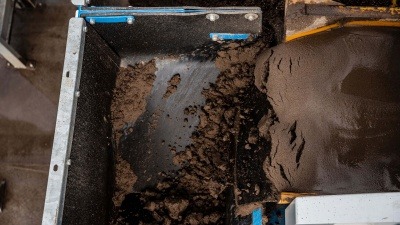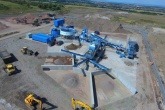Research project to create new materials from recycling’s waste products
Heriot-Watt University will be working alongside Brewster Bros, a Livingstone-based recycling business, to develop new materials from the residual waste left over during the recycling process.
Recycled clay can add up to 25 per cent of the output produced when excavation waste is recycled through a washing process which, at present, will most often end up in landfill.
 This £250,000 Knowledge Transfer Partnership (KTP), funded by Innovate UK, seeks to enhance Scotland’s steps towards a circular economy by researching and developing new sustainable products from waste streams.
This £250,000 Knowledge Transfer Partnership (KTP), funded by Innovate UK, seeks to enhance Scotland’s steps towards a circular economy by researching and developing new sustainable products from waste streams.
The two-year project will also involve the creation of the nation’s first hazardous soil treatment centre, that will be installed in Brewster Bros’ West Lothian site. The site opened in 2018 and claimed to be the UK’s largest recycling plant at the time.
The treatment will use various remediation techniques to transform hazardous soils into a non-hazardous state so that they can then be recycled and reused.
Professor Gabriela Medero, a geotechnical and geoenvironmental engineer from Heriot-Watt University, will oversee the research. She commented: “Recycled clay is an exciting but currently unexplored material which could significantly reduce the waste we send to landfill each year.
“However, many barriers remain that prevent waste from major industries like construction being better utilised, including a lack of scientific understanding about material composition and the criteria for its use as set out by governing bodies like the Scottish Environmental Protection Agency (SEPA).
“Through this project, we will rigorously test the properties and behaviour of the recycled clay to prove it meets Building Standards for product specification by performing a life-size case study on its performance attributes.
“Additionally, we will investigate the use of spent oil shale and incinerator bottom ash as secondary aggregates, producing research evidence in the processing and application techniques which we hope will allay any concerns about their future use.”
Spent oil shale has already been used as a general fill material in building roads for decades but, like recycled clay, this abundant material could be used for higher value applications.
Scott Brewster, Managing Director, Brewster Bros. explains: “The more ambitious and innovative we become when creating new products from waste, the more technical knowledge we will require from experts in their field.
“This Knowledge Transfer Partnership will not only enhance our company’s capabilities and offering, but also provide a vast body of knowledge that will benefit the wider industry as we collectively focus on achieving Net Zero targets.
“A circular business model eases pressure on our country’s remaining landfill capacity and finite mineral resources, while helping our customers to avoid paying landfill tax and the aggregates levy. This will be even more important as businesses focus on a ‘green recovery’ in the post-Covid era.
“By collaborating with Heriot-Watt University, we aim to overcome restrictions on use like waste legislation and obtain end-of-waste approval. However, understanding the true potential of these waste materials is also a key driver.”
SEPA’s data from 2019 revealed that 1.17 million tonnes of soils were disposed of, making up 39 per cent of all waste sent to landfill.
The introduction of this facility comes in the wake of Scotland making stricter environmental regulations such as landfill bans and higher landfill tax.









